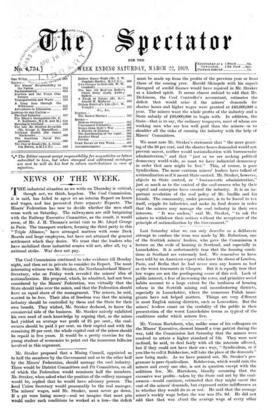Mr. Vernon Hartahorn, who, unlike some of his colleagues on
the Miners' Executive, showed himself a true patr:ot during the war, told the Conunission last Saturday that the miners were resolved to attain a higher standard of life. They were now inclined, he said, to deal fairly with all the interests affected, but if they could not have their own way, "Syndicalism, or if you like to call it Bolshevism, will take the place of the demands" now being made. As we have pointed out, Mr. Straker's pro- gramme is pure Syndicalism. Bolshevism, which would ruin the miners and every one else, is not in question except with the seditious few. Mr. Hartshorn, blandly assuming that the excessive war profits—taken by the State and not by the coal- owners—would continue, estimated that they might cover the cost of the millers' denutn&, but expressed entire indifference as to whether they would do so or not. He said that the average nriner'a weekly wage before the war was 37s. 9d. He did not add that that was about the average wage of every other
workman in the country. The real problem is' how to raise all wages, not the miner's only. The only solution lies in increased production of opal and other 'goods.



































 Previous page
Previous page